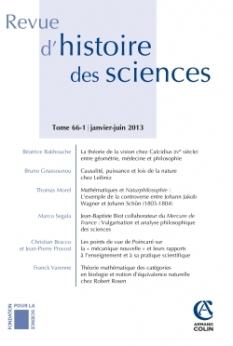
Revue d'histoire des sciences - Tome 66 (1/2013)
Pour acheter ce numéro, contactez-nous
Recevez les numéros de l'année en cours et accédez à l'intégralité des articles en ligne.
L’objectif de cet article est de rendre compte de la justification épistémologique de la proposition faite, dès 1958, par le biomathématicien Robert Rosen d’introduire le concept mathématique de « catégorie » et celui – corrélatif – d’« équivalence naturelle » dans la modélisation mathématique appliquée au vivant. Nos questions sont les suivantes : en quoi la notion mathématique de catégorie permet-elle, selon Rosen, de donner accès à des formalismes plus « naturels » pour la modélisation du vivant ? La naturalité de certaines équivalences (que la notion mathématique de catégorie sert justement à généraliser et à mettre en évidence) est-elle analogue à la naturalité des systèmes vivants ? Rosen semble faire fond sur cette dernière hypothèse, féconde, mais pourtant discutable. Cet article propose ensuite de mesurer l’évolution des arguments de Rosen à ce sujet, en particulier dans ses conséquences apparemment décisives pour la critique des modèles computationnels du vivant, modèles aujourd’hui en pleine expansion.
The aim of this paper is to describe and analyze the epistemological justification of a proposal initially made by the bio-mathematician Robert Rosen in 1958. In this theoretical proposal, Rosen suggests using the mathematical concept of « category » and the correlative concept of « natural equivalence » in mathematical modeling applied to living beings. Our questions are the following : according to Rosen, to what extent does the mathematical notion of category give access to more « natural » formalisms in the modeling of living beings ? Is the socalled « naturalness » of some kinds of equivalences (which the mathematical notion of category makes it possible to generalize and to put at the forefront) analogous to the naturalness of living systems ? Rosen appears to answer « yes » and to ground this transfer of the concept of « natural equivalence » in biology on such an analogy. But this hypothesis, although fertile, remains debatable. Finally, this paper makes a brief account of the later evolution of Rosen’s arguments about this topic. In particular, it sheds light on the new role played by the notion of « category » in his more recent objections against computational models that since the 1990’s are pervading almost every domain of biology.